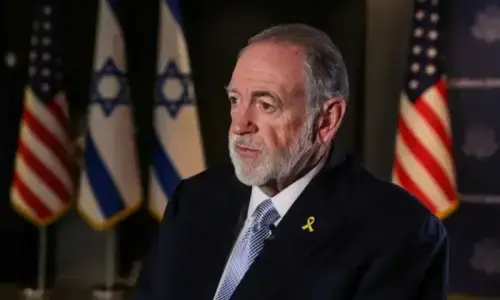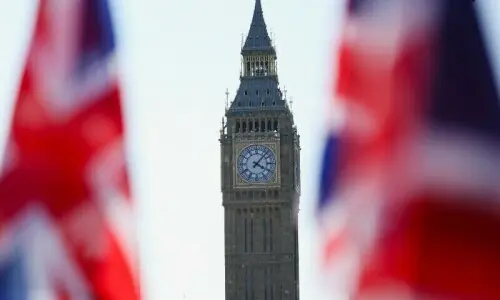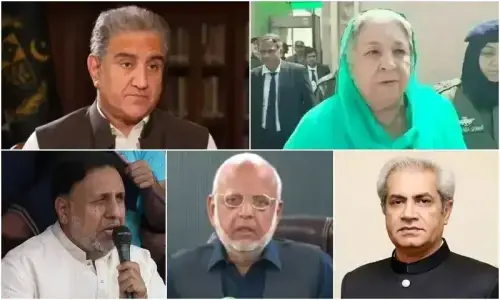CAIRO, July 27: At least 74 unarmed supporters of Egypt’s deposed president were shot dead during clashes with security forces, officials said on Saturday, as anti-military and pro-military rallies were staged.
In the heaviest bloodshed since Mr Morsi’s July 3 overthrow by Gen Abdel Fattah al Sisi-led military coup, Ahmad Aref, spokesman for Mr Morsi’s Muslim Brotherhood, said 66 people died in the violence and another 61 were left “clinically dead”.
The health ministry gave a death toll of 65 in Cairo and another nine in the city of Alexandria since Friday.
A witness earlier counted 37 bodies in a Brotherhood-run field hospital at Cairo’s Rabaa al Adawiya mosque, and the emergency services said other hospitals received an additional 29 corpses.
Egypt’s interior ministry insisted security forces had not used live fire, and blamed the clashes on Brotherhood supporters.
Military-appointed regime’s Interior Minister Mohammed Ibrahim warned that anti-military demonstrations would “soon” be dispersed.
The death toll of unarmed Egyptians by the security forces prompted worldwide condemnation and consternation. The latest violence erupted at dawn on Saturday outside the mosque, where Brotherhood supporters have been camped since the week after the coup. Military-controlled state media and the interior ministry said police fired tear gas at stone-throwing protesters on the airport road, but witnesses said that security forces had fired live bullets.
By midday, medical workers began ferrying bodies wrapped in white shrouds to hospitals, carrying them on blood-soaked stretchers past a furious throng of anti-military protesters.
“Allahu Akbar!,” chanted the crowd which formed a corridor to waiting ambulances.
Some wept and women ululated defiantly as each body was taken from the makeshift morgue in a section of the mosque.
Pro-coup protests were likewise held on Friday in Egypt’s second city Alexandria, where the ministry said nine people were killed.
The military action in Cairo was the deadliest since 53 unarmed Brotherhood supporters were killed by the security forces outside the army’s elite Republican Guard headquarters in the capital on July 8.
It prompted condemnation from Ahmed al Tayeb, the sheikh of Egypt’s prestigious institution, Al Azhar University.
He called for an “urgent judicial investigation” and punishment of those responsible, “regardless of their affiliation”.
Mr ElBaradei, who joined the military-appointed regime that took over after deposed president Morsi’s ouster, condemned what he termed the “excessive use of force”. International governments also joined the condemnation, with British Foreign Secretary William Hague urging “Egyptian authorities to respect the right of peaceful protest, to cease the use of violence against protesters, including live fire, and to hold to account those responsible”.
The EU urged “a rapid move to an inclusive transformation process” that would include the Muslim Brotherhood.
Regime’s interior ministry defended the actions of security forces, with spokesman General Hany Abdel Latif insisting that police “did not use more than tear gas”.
He accused Brotherhood supporters of firing on the security forces, wounding 14 policemen, including two who were in critical condition after being shot in the head.
Military-appointed interior minister Ibrahim said security forces would act to disperse the pro-Morsi demonstrations “in a legal fashion” and “as soon as possible”.
Security forces would seek to ensure “the minimum losses possible”, he said, expressing hope that Mr Morsi supporters would “come to their senses” and go home.
The bloodshed came hours after army chief General Abdel Fattah al-Sisi, who led the military coup that deposed president Morsi, called for a mass show of support for a crackdown on “terrorism”. Hundreds of thousands of pro-military supporters obliged, thronging Cairo’s Tahrir Square and around the Itihadiya presidential palace.
But Mr Morsi supporters said their turnout showed many “reject the bloody, military fascist coup that wants to set the wheel of history back”.
On Friday, authorities remanded Mr Morsi in custody for 15 days, accusing him of the “premeditated murder of some prisoners, officers and soldiers” when he broke out of prison during the 2011 people’s uprising that toppled pro-West and military-backed dictator Hosni Mubarak, MENA said.
He also stands accused of conspiring to “storm prisons and destroy them... allowing prisoners to escape, including himself”.
The military has so far kept Mr Morsi’s whereabouts secret to avoid attracting protests by his supporters.
Egypt, the Arab world’s most populous country, has been rocked by military takeover that has now killed some 300 people in the less than four weeks since the military coup.—AFP

































